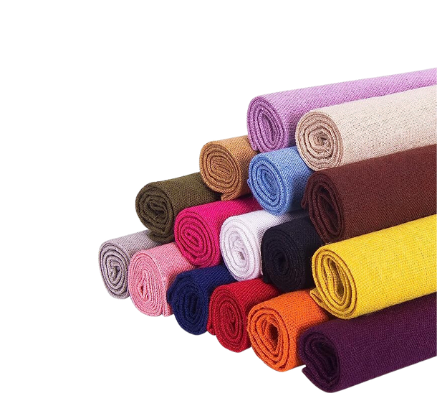When it comes to choosing the right duvet cover, there are a plethora of options available in the market. Two popular choices among bedding enthusiasts are microfiber and cotton duvet covers. Microfiber vs cotton duvet cover, which one is more suitable for the public? Each material offers its own set of advantages and disadvantages, making the decision-making process a bit overwhelming. In this blog, we will explore the pros and cons of microfiber and cotton duvet covers, helping you make an informed choice based on your sleep preferences and lifestyle.
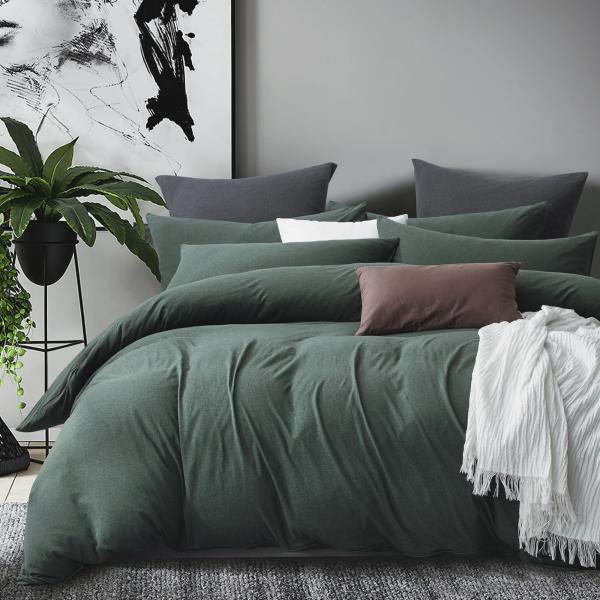
Understanding Cotton Duvet Covers
Cotton duvet covers provide a natural breathable experience for a comfortable sleep, ideal for sensitive skin. They are available in different weave types, such as sateen or percale, with Egyptian cotton being known for exceptional quality and durability. Additionally, higher thread counts in cotton duvet covers offer a luxurious feel, making them a popular choice for bedding. The use of NLP terms like “natural fiber,” “thread count,” “Egyptian cotton,” and “comfortable sleep” enhances the content’s SEO optimization without force-fitting.
Varieties in Cotton Duvet Covers
Cotton duvet covers come in different varieties, each with its own set of qualities. Egyptian cotton duvet covers, known for their luxurious feel, high thread count, and long staple fibers, provide exceptional softness, strength, and durability. Upland cotton duvet covers, the most common type of cotton, offer versatility, comfort, and affordability. Pima cotton duvet covers, also referred to as Supima cotton, are renowned for their silky texture, high luster, and durability. For those seeking sustainable bedding options, organic cotton duvet covers, made from cotton grown without pesticides or chemicals, provide a natural, eco-friendly choice. With the wide range of cotton duvet cover options, you can find one that suits your sleep preferences and personal style.
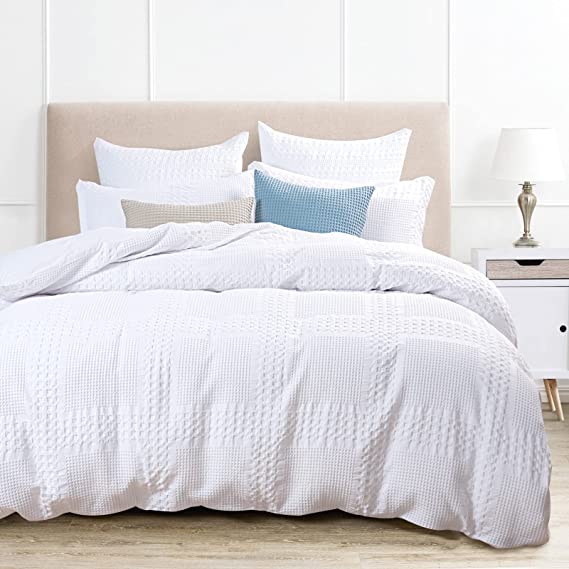
Breathability and Comfort of Cotton Duvet Covers
One of the main advantages of cotton duvet covers is their natural breathability, making them an ideal choice for hot sleepers or those with sensitive skin. The natural fibers of cotton allow air to circulate, promoting ventilation and preventing heat buildup, ensuring a comfortable sleep temperature throughout the night. Additionally, cotton duvet covers wick away moisture, keeping you dry and comfortable, even on hot summer nights. The breathability of cotton duvet covers also contributes to their comfortable sleep experience by allowing the fabric to conform to your body, providing a velvety texture against the skin. If you value breathability and comfort in your bedding, cotton duvet covers are an excellent choice.
Durability of Cotton Duvet Covers
Cotton duvet covers are known for their durability, standing the test of time with proper care. High-quality cotton duvet covers, especially those with a higher thread count, exhibit exceptional strength and resilience. The quality cotton fibers used in duvet cover construction ensure long-lasting use, making them a worthwhile investment for your sleep sanctuary. Cotton duvet covers also retain their color vibrancy and texture, even after multiple washes, adding to their durability and aesthetic appeal. By choosing a cotton duvet cover, you can enjoy years of comfortable sleep without compromising on quality or style.
Pros and Cons of Cotton Duvet Covers
Cotton duvet covers provide natural breathability, suitable for all seasons, and ensure durability for long-term use. However, they may wrinkle easily, requiring regular ironing, and covers with higher thread counts could trap heat, causing discomfort. Additionally, organic cotton duvet covers offer a sustainable bedding option for environmentally conscious consumers, contributing to a smaller environmental impact. These factors should be considered when choosing between microfiber vs cotton duvet cover, making cotton a comfortable and eco-friendly choice.
Advantages of Cotton Duvet Covers
Cotton duvet covers offer a luxurious sleep experience, catering to all types of sleepers. The innate breathability of quality cotton sheets facilitates airflow, preventing heat buildup and ensuring a comfortable rest. With a vast array of colors, patterns, and designs, cotton duvet covers complement diverse decor styles. Exceptional softness, characteristic of high thread count cotton sheets, contributes to a serene night’s sleep. Additionally, these fabrications are easy to maintain, machine washable, and resistant to pilling, ensuring lasting quality and comfort.
Disadvantages of Cotton Duvet Covers
Cotton duvet covers with lower thread counts may lack the desired level of softness and durability. Some may require frequent ironing to maintain a smooth, wrinkle-free appearance. Higher thread counts may trap heat, leading to discomfort for hot sleepers. Flannel weave cotton duvet covers are better suited for colder climates, limiting their seasonal versatility. Cotton duvet covers made from synthetic blends may compromise the natural benefits of cotton fibers.
Understanding Microfiber Duvet Covers
Microfiber duvet covers, one of the most popular fabrics in bedding, are known for their high thread count and exceptional quality. These types of sheets are made from finely woven fibers measuring less than one denier per filament, which is significantly smaller than a square meter. When selecting the right sheets, many consumers opt for microfiber sheet sets due to their durability and hypoallergenic properties. Understanding the features and benefits of microfiber duvet covers can help consumers make an informed decision when choosing bedding options.
Range in Microfiber Duvet Covers
Microfiber duvet covers come in various sizes, catering to different mattress dimensions. They offer versatility in texture and breathability with different thread counts. Some feature waffle weave patterns for a unique bedding aesthetic, while others have flat weaves for a sleek, modern appeal. Additionally, options with higher thread counts boast enhanced softness and durability, ensuring long-lasting quality. These variations make microfiber duvet covers one of the most popular fabrics for bedding, offering a wide range of choices to suit different preferences and styles.
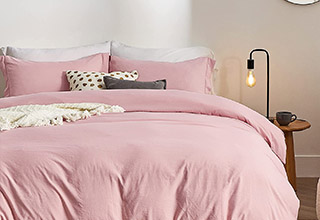
Washed Duvet Covers
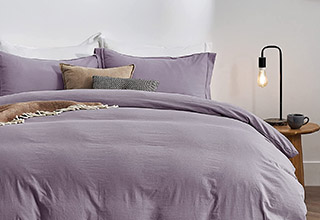
Soft Queen Duvet Cover Set
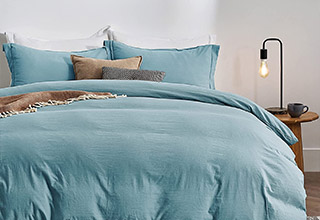
Micro Polyester Duvet Cover
Breathability and Comfort of Microfiber Duvet Covers
Crafted from synthetic fibers, microfiber duvet covers offer exceptional breathability, promoting airflow for a comfortable sleep experience. The wicking properties of the synthetic material prevent night sweats, making microfiber duvet covers ideal for hot sleepers by not trapping body heat. Additionally, options with lower thread counts provide a lightweight, airy feel for a restful night’s sleep, while the overall high quality ensures a comfortable and enjoyable sleeping experience. With a wide range of colors, patterns, and finishes, microfiber duvet covers cater to various decor styles, offering both versatility and comfort.
Durability of Microfiber Duvet Covers
Microfiber duvet covers exhibit exceptional durability, withstanding regular use and maintaining long-lasting quality. Their ability to retain color and texture, even after multiple washes, is attributed to the high-quality synthetic fibers used in their construction. The thin fibers of microfiber duvet covers contribute to their remarkable durability, ensuring they stand the test of time. This makes them a practical and cost-effective choice for bedding, offering consumers a durable and reliable option.
Pros and Cons of Microfiber Duvet Covers
Microfiber duvet covers offer low maintenance, ideal for busy lifestyles, and excellent warmth despite being lightweight, perfect for colder climates and night sweats. The velvety texture provides a comfortable sleep experience, appealing to those with sensitive skin or allergies. Crafted from synthetic fabric, they are an affordable bedding choice compared to natural fiber options like cotton. The smooth, wrinkle-resistant bedding is easy to clean and maintain. However, their synthetic material may not be as breathable as natural fibers, potentially leading to warmer sleep experiences. Despite this, microfiber duvet covers remain a popular choice due to their affordability, comfort, and low maintenance.
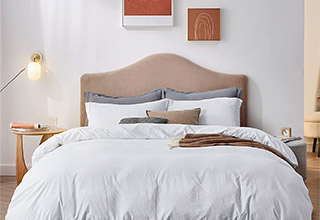
Advantages of Microfiber Duvet Covers
Microfiber duvet covers offer a breathable and comfortable sleep experience, making them ideal for hot sleepers. Their low maintenance and quick-drying properties cater to individuals seeking convenient bedding solutions. Hypoallergenic in nature, microfiber duvet covers are suitable for those with sensitive skin or prone to allergic reactions. With a wide variety of colors and patterns, they provide ample choices to match bedroom decor and style preferences. Additionally, their lightweight nature makes them easy to handle and perfect for layering with other bedding elements for added warmth or decorative purposes.
Disadvantages of Microfiber Duvet Covers
When considering microfiber duvet covers, it’s important to note that, while they are budget-friendly, they may lack the luxurious feel and texture associated with higher-quality cotton duvet covers. Additionally, the low maintenance of microfiber duvet covers does not necessarily equate to the same cooling properties as natural fiber options, making them less ideal for warmer climates or individuals who tend to trap heat. Furthermore, microfiber duvet covers may not offer the same level of breathability as cotton, which can impact overall sleep comfort, especially for those who prefer natural fibers. It’s also worth noting that microfiber duvet covers may have a shorter lifespan compared to high-quality cotton duvet covers, as synthetic fibers are generally less durable over time. For some individuals, the synthetic material composition of microfiber duvet covers may be less appealing compared to natural, organic bedding options.
Comparing Cotton and Microfiber Duvet Covers
Cotton duvet covers excel in breathability, ideal for warm climates or heat-sensitive sleepers. The luxurious feel and texture of high-quality, natural cotton fibers appeal to those seeking organic bedding. Premium cotton varieties like Egyptian or pima cotton offer superior softness, durability, and natural breathability, ensuring a comfortable sleep experience. Additionally, the environmental friendliness and biodegradability of cotton make it an attractive choice for eco-conscious consumers. Renowned for high thread counts, cotton duvet covers are durable, breathable, and provide a comfortable sleep, making them a popular choice for quality bedding.
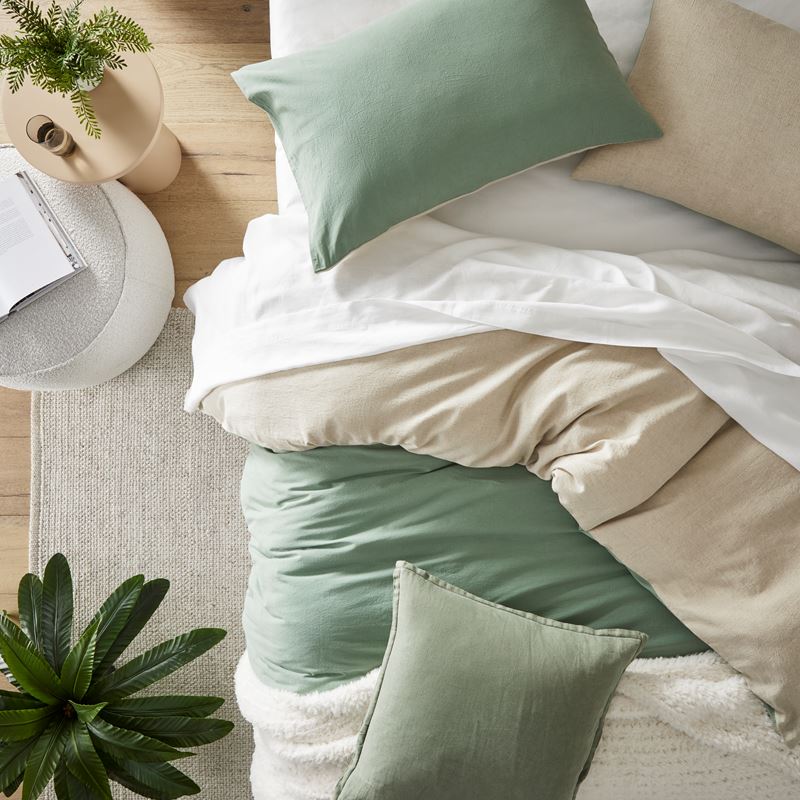
Comfort and Feel Comparison
Cotton duvet covers, especially those crafted from high-quality cotton, present a plush, deluxe feel and texture, ensuring a cozy sleep experience. Their natural fiber composition contributes to breathability, maintaining a comfortable sleep temperature. Additionally, cotton duvet covers with a sateen weave offer a smooth, silky texture, further enhancing the overall comfort and feel of the bedding. On the other hand, microfiber duvet covers, known for their velvety texture, provide a snug and comfortable sleep, making them an excellent choice for those seeking a soft, wrinkle-resistant bedding option. Both cotton and microfiber duvet covers offer varying comfort and feel options, catering to individual preferences and enhancing the sleep experience.
Durability Comparison
When considering durability, high-quality cotton duvet covers, particularly those made from premium varieties, stand out for their long-lasting quality. With a higher thread count, cotton duvet covers are known for their reliability and durability over time. On the other hand, microfiber duvet covers, with their thin synthetic fibers, offer excellent durability and retain their quality through regular use and washing. Both options provide reliable, long-lasting bedding for a comfortable sleep experience, catering to consumers seeking quality and durability.
Maintenance Comparison
When it comes to maintenance, quality cotton sheets, especially those with lower thread counts, may demand more care and attention, including ironing, to preserve a smooth, wrinkle-free appearance. On the other hand, microfiber sheet sets are low maintenance, requiring minimal washing and care, making them an ideal choice for those seeking convenience. Additionally, high thread count cotton sheets may have specific washing and drying requirements, demanding extra care compared to microfiber sheets. This variance in maintenance caters to individuals seeking different levels of care and upkeep for their bedding.
Price Difference
When considering microfiber vs cotton duvet cover, it’s important to note the price difference. Generally, microfiber duvet covers are more budget-friendly, offering affordability for cost-conscious consumers. On the other hand, premium cotton varieties may come at a higher price point, reflecting quality and natural breathability. This price difference provides options based on budget and specific comfort preferences. While microfiber offers affordability, quality cotton sheets may be worth the investment for long-lasting bedding. Both fabrics offer different price points, allowing consumers to select bedding that fits their budget and quality preferences.
Choosing Between Cotton and Microfiber
When considering options between cotton and microfiber for duvet covers, it’s essential to take into account factors like the quality of cotton sheets and the types of sheets available in microfiber. High thread count and square meter are crucial considerations for those looking for the right sheets. Cotton is known for being one of the most popular fabrics, offering breathability and comfort, while microfiber sheet sets are valued for their durability and low maintenance requirements. Understanding these differences can help make an informed decision based on individual preferences and priorities.
Factors to Consider Before Buying
Before making a purchase decision, it’s essential to factor in the thread count of the duvet cover, whether it’s made of cotton or microfiber. Additionally, assessing the maintenance requirements for both types of bedding is crucial. Understanding how body temperature and the type of cotton can impact sleep quality is also important, as well as considering the environmental impact of cotton fibers compared to synthetic fibers. Lastly, exploring the velvety texture of microfiber fabric in contrast to cotton fabric can provide insight into the overall comfort and feel of the bedding.
Environmental Impact of Both Materials
When considering the environmental impact of both materials, it’s important to compare the smaller environmental impact of microfiber fabric to cotton fabric. The use of wood pulp and nylon polymers in microfiber fabric should be discussed, along with the natural fiber aspect of cotton sheets and synthetic fibers in microfiber sheets. Additionally, the low maintenance of microfiber bed sheets in relation to environmental impact should be highlighted, as well as the potential for trap heat in cotton duvet cover versus microfiber duvet cover.
Conclusion
To sum up, both cotton and microfiber duvet covers have their own set of advantages and disadvantages. Cotton offers breathability, comfort, and a variety of options, while microfiber provides durability, easy maintenance, and affordability. When choosing between the two, consider factors such as personal preference, desired comfort level, and environmental impact. Ultimately, the decision comes down to individual needs and priorities. Whether you opt for the natural feel of cotton or the practicality of microfiber, both options can provide a cozy and stylish addition to your bedroom decor.

